(Take a virtual tour of Jubilee Biodynamic Farm here.)
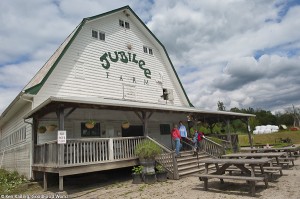
How does one farm feed nearly a 1000 people? No, it’s not the miracle of the loaves and fishes; it’s the miracle of good soil, organic cropping, rotational grazing, and a community of busy hands.
Jubilee Biodynamic Farm, Carnation WA, supplies 400 families with fruit, vegetables, and meat through a Community Supported Agriculture (CSA) program – all from just 40 intensively-farmed acres.
A fisherman turned farmer, Erick Haakenson, his wife Wendy, his son David and David’s wife Kristin are the core of the operation, but more than 80 other sets of hands help keep the farm productive.
Erick, who is a philosopher and theologian, started farming in 1989 and this summer will be the farm’s 17th year delivering fresh produce to CSA members. Jubilee was the second CSA started in the state of Washington, the first was The Root Connection, Woodinville WA, launched in 1987 by Claire Thomas.
What is “Biodynamic?”
Biodynamics is a different way of looking at farming with respect for the health of the land, the food produced on it, and the community the land supports.
A healthy farm is its own ecosystem, and by balancing what goes into the farm and what is taken out, farmers like Erick capture nutrients from cattle grown on the farm. Composting the manure from his herd of 70 cows means he can supply the farm’s nutrient needs without buying fertilizer of any kind.
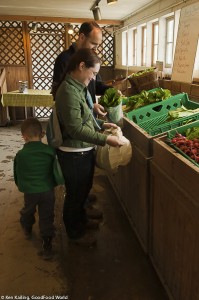
As a practice, biodynamics also has a community connection; agriculture should be a communal activity. Jubilee Biodynamic Farm is a teaching farm for farm workers, interns, and beginning farmers, focusing on organic and biodynamic farming methods. The most obvious community connection for farms like Jubilee is the number of families who have chosen to buy into the farm through shares of the production as members of a CSA.
According to the 2007 Census of Agriculture, the most recent numbers available from the USDA, there were 12,550 farms in the U.S. that had marketed products through a CSA. Since then, more and more farms are offering their products to families through pre-paid shares in the farms’ production.
CSA – Variations On a Theme
It is believed that the first CSA program in the U.S. appeared in the early 1980s, although the concept had been in place in Europe and Japan since the 60s. Since then the programs have expanded to allow subscribers or members to support a wide variety of food production.
Produce CSA: A large majority of the CSAs in place now offer vegetable or vegetable and fruit shares. Occasionally the farm will partner with other producers or artisan bakers to offer additional items to shareholders.
Meat CSA: A more recent development is a meat CSA where a farm offers periodic delivery of meat cuts or chicken to shareholders. Crown S Ranch, Winthrop WA, has four different CSA plans: beef, pork, lamb, and broiler chickens and eggs.
Bean CSA: Lonesome Whistle Farm, Eugene OR, offers a dried bean CSA. Subscribers get 3 pounds each of 8 varieties of dried beans.
Flour and Grain CSA: Bluebird Grains, Winthrop WA, provides members with whole grains, flours, cereal, and mixes through a monthly CSA delivery. Bluebird Grain ships the flour UPS or USPS rather than delivering to neighborhood drop points.
Fish CSF (Community Supported Fishery): Following the CSA model, CSF shareholders pay a flat rate to a fisherman up front for a share of his or her catch for the fishing season. Most CSFs deliver a range of whole fish, so customers experience variety and seasonality. Northwest Atlantic Marine Alliance lists 19 CSFs that offer everything from shellfish and lobsters to fin fish.
CSA and Home Delivery Services

Community Supported Agriculture or Home Delivery Service? Both offer boxes of food direct to consumers, but there are some clear differences.
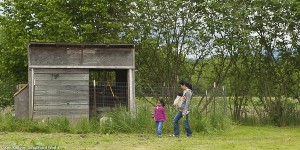
A CSA – Community Supported Agriculture – is organized around a farm that grows food and distributes what it grows to a community of people who support the farm – for better or worse. Shareholders buy into a CSA at the beginning of the growing season, when the farmer needs the funding most. Spring and early summer are the time of the year when the cash outflows far exceed the income.
As shareholders, CSA members both benefit from a successful farming season and share the risk when the production is down due to pests, bad weather, or crop failure. A CSA is a commitment between members and the farmer, not just a convenient way to buy local food.
There are many differences among CSAs, but most include delivery to area drop-off stations and have farm pick-up days for members – both on a regular schedule. Many CSAs provide standard boxes of preselected items for members; some may offer alternate selections by item or category.
Home delivery services are purveyors of food as a commodity. They buy food wholesale from producers and/or distributors and deliver it to people’s homes. The food may be primarily conventional products, like those delivered by Amazon Fresh or organic produce like that delivered by Full Circle.
Amazon Fresh, launched a few years ago as a test project, delivers to a limited number of neighborhoods in Seattle. Customers can select from a variety of fresh, frozen, canned and prepared foods – and some organic products – to be delivered same day or next day. Deliveries are made before 6 AM for a “Pre-Dawn Doorstep Delivery” or during the day by appointment for customer acceptance at the door.
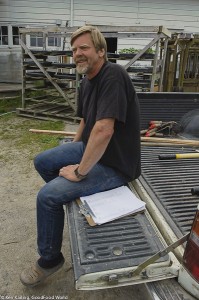
Launched in 1996 as a small CSA called Full Circle Farm, the company has grown into a sophisticated food delivery system servicing 16,000 customers with weekly or bi-weekly deliveries in 3 states, including Alaska. Along the way, Full Circle changed its branding from a farm-based CSA to a “Farm to Table” delivery service and the word “Farm” got dropped from the company’s name.
Full Circle grows a small percentage of its own produce on a 400-acre farm in Carnation WA and buys the remaining items it delivers from farmers and distributors of organic produce. Full Circle has evolved into a broker for about 150 other organic farms and artisan producers across the U.S. and Mexico – and some abroad.
Do consumers know the difference between a home delivery service and a CSA? It’s a matter of connection. A home delivery service is a company that focuses on consumer convenience rather than commitment to a local farm.
CSAs are not, first and foremost, about profit. As Erick Haakenson says, “The focus for those of us who publicly (and proudly) call our farms ‘CSA farms’ is on trying to be the real thing: diversified, organic, sustainable farms which offer consumers the opportunity to ‘vote with their food dollars’ about whether such local farming is a good thing or not.”

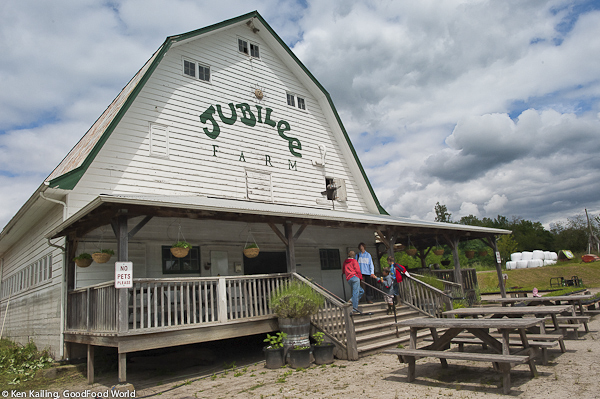
Great article Ken! The graphic on the spectrum from CSA to Subscription is useful too. Joanne